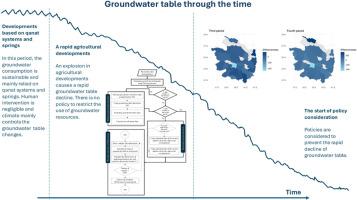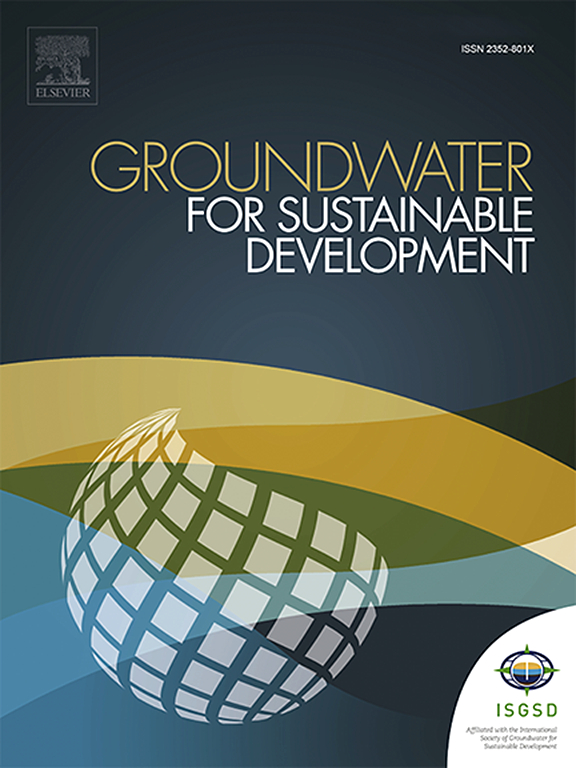伊朗地下水改善迹象:政府政策有效吗?
IF 4.9
Q2 ENGINEERING, ENVIRONMENTAL
引用次数: 0
摘要
地下水作为干旱地区的唯一水源,在社会经济发展中起着至关重要的作用。伊朗的农业发展依赖地下水资源,导致地下水位急剧下降。为了防止地下水的快速枯竭,政府出台了一些政策,包括检测和封堵非法水井,安装智能仪表系统来控制地下水的抽取。尽管这些政策已经实施了15年,但它们的有效性仍然是研究人员、专家和公众争论的话题。缺乏评估实施政策有效性的框架是伊朗一个突出的研究缺口。因此,本研究试图通过在呼罗珊拉扎维省制定一个量身定制的框架来评估实施政策的有效性。利用844个压力计的地下水位实测数据,对39个含水层进行了应用。调查结果显示,实施的政策成功地防止了几乎所有含水层的地下水迅速枯竭。安装智能水表系统被认为是控制地下水快速枯竭最有效的政策。所建议的度量是可转移的,可应用于任何含水层。这项研究的结果为伊朗地下水政策的进一步发展提供了有价值的见解。本文章由计算机程序翻译,如有差异,请以英文原文为准。

Sign of groundwater improvement in Iran: Were governmental policies effective?
Groundwater, as the only source of water in arid regions, plays a crucial role in socio-economic developments. Relying on groundwater resources, agricultural developments in Iran have caused a dramatic decline in groundwater table. To prevent the rapid groundwater depletion, the government initiated some policies including detecting and sealing illegal wells and installing smart meter systems to control the groundwater withdrawal. Despite the implementation of these policies over the past 15 years, their effectiveness is still a subject of debate among researchers, experts, and the public. The absence of a framework to evaluate the effectiveness of applied policies is a highlighted research gap in Iran. Therefore, this study attempts to evaluate the effectiveness of implemented policies by developing a tailor-made framework in Khorasan Razavi province. The proposed framework is applied on 39 aquifers utilizing piezometric data of groundwater table in 844 piezometers. Findings showed implemented policies successfully contributed in preventing rapid groundwater depletion in almost all aquifers. Installing smart meter systems is detected as the most impactful policy in harnessing the rapid groundwater depletion. The proposed metric is transferable and can be applied to any aquifer. The outcomes of this research offer valuable insights for further developments of groundwater policies in Iran.
求助全文
通过发布文献求助,成功后即可免费获取论文全文。
去求助
来源期刊

Groundwater for Sustainable Development
Social Sciences-Geography, Planning and Development
CiteScore
11.50
自引率
10.20%
发文量
152
期刊介绍:
Groundwater for Sustainable Development is directed to different stakeholders and professionals, including government and non-governmental organizations, international funding agencies, universities, public water institutions, public health and other public/private sector professionals, and other relevant institutions. It is aimed at professionals, academics and students in the fields of disciplines such as: groundwater and its connection to surface hydrology and environment, soil sciences, engineering, ecology, microbiology, atmospheric sciences, analytical chemistry, hydro-engineering, water technology, environmental ethics, economics, public health, policy, as well as social sciences, legal disciplines, or any other area connected with water issues. The objectives of this journal are to facilitate: • The improvement of effective and sustainable management of water resources across the globe. • The improvement of human access to groundwater resources in adequate quantity and good quality. • The meeting of the increasing demand for drinking and irrigation water needed for food security to contribute to a social and economically sound human development. • The creation of a global inter- and multidisciplinary platform and forum to improve our understanding of groundwater resources and to advocate their effective and sustainable management and protection against contamination. • Interdisciplinary information exchange and to stimulate scientific research in the fields of groundwater related sciences and social and health sciences required to achieve the United Nations Millennium Development Goals for sustainable development.
 求助内容:
求助内容: 应助结果提醒方式:
应助结果提醒方式:


